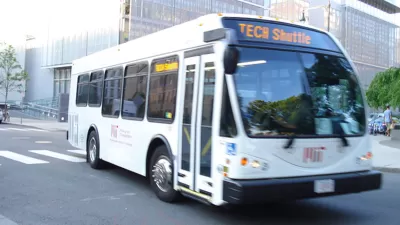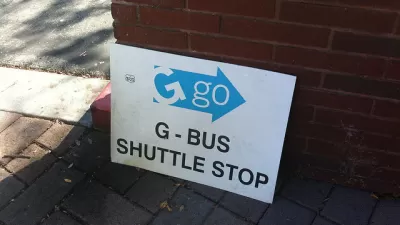A San Francisco Chronicle editorial supports the decision by the Municipal Transportation Agency to 'bow' to complaints from residents about the large tech buses by reducing their stops in their neighborhoods even if it means increasing car trips.

"Bowing to complaints from residents in congested neighborhoods like the Mission, the San Francisco Municipal Transportation Agency has been regulating the stops for the large buses that ferry technology workers to campuses on the Peninsula," editorializes the paper.
Moving shuttle stops from smaller streets onto larger ones will reduce neighborhood congestion and improve quality of life.
Moving the stops by only a few blocks asks tech workers to make only the tiniest of sacrifices.
A post on Monday indicates that "fewer Facebook employees are taking the shuttle and choosing to drive instead—according to a recent Facebook report to the city of Menlo Park."
According to that report, "on May 9, trips entering Facebook’s complex at One Hacker Way increased by about 16 percent to 12,400 compared with May 8 of last year.
"It’s unfortunate that more workers are choosing to drive to work," continues the editorial. "But the fault here is with those workers. It’s not with the city transportation agency."
In other words, blame commuters for resorting to their cars rather than walking up to half a mile to new bus stops after the transportation agency took away their old stops.
The bias against the city's technology workforce that commutes to the Peninsula and South Bay is acknowledged in the editorial's conclusion. About one-third of Facebook’s employees live in San Francisco, according to Wendy Lee's earlier article in The Chronicle.
If there was a bias in this case, it was that the agency chose to weigh more heavily complaints from the San Francisco neighborhoods than the convenience of technology companies who aren’t based within the city’s limits. San Francisco residents are the ones who pay the SFMTA’s bills, so that’s right and fair.
It would seem that the paper overlooks the fact that commuters to Facebook and other tech companies are San Francisco residents as well.
More on how the technology shuttles have reshaped Silicon Valley's workforce here.
FULL STORY: SFMTA has the right compromise on tech buses

Alabama: Trump Terminates Settlements for Black Communities Harmed By Raw Sewage
Trump deemed the landmark civil rights agreement “illegal DEI and environmental justice policy.”

Study: Maui’s Plan to Convert Vacation Rentals to Long-Term Housing Could Cause Nearly $1 Billion Economic Loss
The plan would reduce visitor accommodation by 25% resulting in 1,900 jobs lost.

Planetizen Federal Action Tracker
A weekly monitor of how Trump’s orders and actions are impacting planners and planning in America.

Wind Energy on the Rise Despite Federal Policy Reversal
The Trump administration is revoking federal support for renewable energy, but demand for new projects continues unabated.

Passengers Flock to Caltrain After Electrification
The new electric trains are running faster and more reliably, leading to strong ridership growth on the Bay Area rail system.

Texas Churches Rally Behind ‘Yes in God’s Back Yard’ Legislation
Religious leaders want the state to reduce zoning regulations to streamline leasing church-owned land to housing developers.
Urban Design for Planners 1: Software Tools
This six-course series explores essential urban design concepts using open source software and equips planners with the tools they need to participate fully in the urban design process.
Planning for Universal Design
Learn the tools for implementing Universal Design in planning regulations.
Caltrans
Smith Gee Studio
Institute for Housing and Urban Development Studies (IHS)
City of Grandview
Harvard GSD Executive Education
Toledo-Lucas County Plan Commissions
Salt Lake City
NYU Wagner Graduate School of Public Service




























